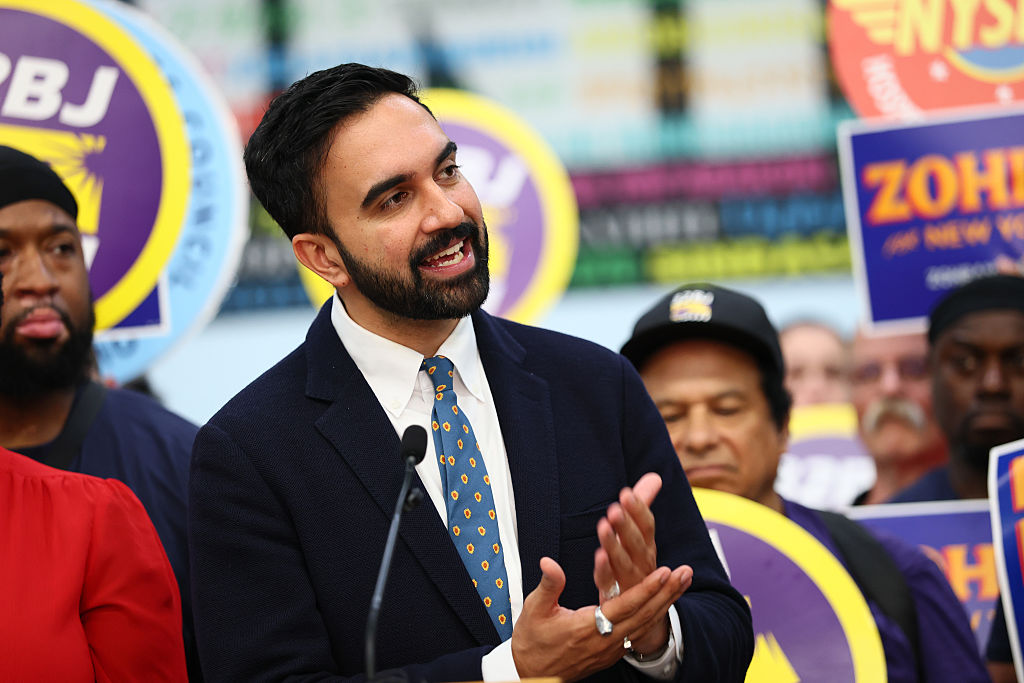A bowl of biryani, a political interview and a right-wing firestorm: such was the trajectory of a resurfaced video of New York City mayoral candidate Zohran Mamdani, who was recently targeted by Republican Congressman Brandon Gill — not for his policies, but for how he eats.
In the clip, first recorded in 2023 by Uncivilised Media, the 33-year-old Democrat eats biryani with his hands while fielding questions about his campaign. “The holy grail of taboos in American politics,” the interviewer says, “which include socialism, Islam and Palestine. You are really going for the trifecta. Tell me, why is Palestine a part of your politics?”
“When you grow up as someone, especially in the third world,” Mamdani responds, “you have a very different understanding of the Palestinian struggle.”
The footage was later repackaged by the far-right social media account “End Wokeness” and shared widely, including by Gill, a freshman congressman from Texas. “Civilized people in America don’t eat like this,” he wrote on X. “If you refuse to adopt Western customs, go back to the Third World.”
The response from the right was swift and unsparing. Within hours, Mamdani — who was born in Uganda and raised in New York — became the target of a wave of racist and Islamophobic commentary, much of it positioning his eating habits as symbolic of something fundamentally un-American.
Far-right activist Laura Loomer was among the first to pile on. “Disgusting,” she wrote. “My dogs are cleaner and more civilized when they eat than little Muhammad.” Others were slightly more subtle in their contempt. Several users pointed out that Gill’s wife, Danielle D’Souza—an author and the daughter of conservative firebrand Dinesh D’Souza—is of Indian descent, where eating with one’s hands is not only accepted but often expected for certain traditional meals.
Danielle responded anyway. “I did not grow up eating rice with my hands and have always used a fork,” she posted. “I was born in America. I’m a Christian MAGA patriot. My father’s extended family lives in India and they are also Christian and they use forks too. Thank you for your attention to this matter.”
Her father chimed in with his own lesson in cross-cultural cutlery etiquette: “Eating with your hands is acceptable when it’s bread, naan or pizza. Not when it’s soup, meatloaf or mashed potatoes,” Dinesh D’Souza wrote, alongside a photo of himself dining out. “Indians sometimes eat rice with their hands in India, but it’s much more common in rural areas. In America, it’s considered gross.”
Want more great food writing and recipes? Sign up for Salon’s free food newsletter, The Bite.
Of course, eating with one’s hands isn’t some careless or unclean impulse — it’s a practiced tradition that spans continents, centuries and entire systems of thought. In many parts of the Middle East and South Asia, for instance, eating with the right hand is not only customary but essential. The left hand, considered unclean, is reserved for personal hygiene. Sharing food, offering dishes, and even greeting others are all done with the right; it’s an etiquette rooted in respect, not rebellion.
In India, the practice draws from Ayurvedic philosophy, which teaches that the five elements — earth, water, fire, air and space—are represented in the five fingers. Using one’s hands to eat is seen as a way to engage all the senses, to bring the body into deeper harmony with the food, with each finger representing a different element. The act of eating, then, becomes something intimate, connected and almost spiritual.
It’s precise. It’s learned. And, as former Indian Prime Minister Jawaharlal Nehru once reportedly said, “Eating biryani with a fork and knife is like making love through an interpreter.”
But of course, this wasn’t just a debate about dining etiquette. It was a textbook case of cultural othering, one that casts non-Western practices as primitive and noncompliance with a certain white, Christian, nationalist ideal as grounds for exile. In this telling, Mamdani wasn’t simply eating rice — he was signaling foreignness, defiance and a refusal to assimilate. That his choice of meal, identity and political stance all intersected in a single clip only made it easier for far-right voices to mobilize around a familiar narrative: if you look or sound or eat differently, you don’t belong here.
We need your help to stay independent
It’s a tactic as old as the culture wars themselves, now repackaged for social media with the speed and virality of a meme. Which makes the timing of it all especially rich.
As the country heads into July 4th weekend — a national holiday defined by paper plates, barbecue sauce and a proud disregard for utensils — the sanctimony around “civilized” eating feels more than a little selective. This is, after all, a nation that celebrates its independence by eating with its hands. Ribs, hot dogs, fried chicken, corn on the cob, watermelon slices. All gleefully finger-fed. No forks required.
It’s hard to imagine Congressman Gill objecting to someone tearing into a brisket sandwich at a backyard cookout. But biryani, served in a tray during an interview? That’s somehow where the line gets drawn.
Read more
about this topic


